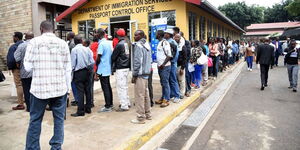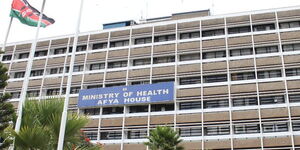Families were forced to restructure their food budget after the prices of tomatoes hit a record high in January 2023.
According to Consumer Price Indices and Inflation rates for January 2023 released by the Kenya National Bureau of Statistics (KNBS) on Tuesday, January 31, the price of tomatoes jumped by 8.1 per cent.
KNBS indicated that the price of tomatoes surged to hit Ksh102.5 per kilogramme. In December, a kilo retailed at Ksh97.40.
The sharp increase was high compared to beans which recorded a 1.7 per cent increase to hit Ksh166 per kilogramme.
Besides beans, the spike in tomato prices exceeded an increase in beef. The increase forced families to drop tomatoes from their shopping lists while others used them in small portions.
The price increase report came just a day after traders complained about low market supply. Traders were compelled to scramble for the rare farm produce.
Hoarding of tomatoes also contributed to the sharp increase for the last 30 days forcing Kenyans to spend more.
According to the Central Bank of Kenya (CBK), the Monetary Policy Committee (MPC) meeting dated Tuesday, January 31, attributed the sharp increase in agricultural products to low rainfall and unpredictable weather patterns.
"The Survey of the Agriculture Sector revealed that prices of most food items were expected to decline or remain unchanged in February 2023," CBK stated.
"Nevertheless, respondents identified high input costs and unpredictable weather conditions as the major factors constraining agricultural production," CBK added.
Speaking to Kenyans.co.ke agricultural expert Brian Muuo attributed the increase to the shortage of farm inputs. Muuo argued that Kenya was still dependent on fertiliser imports, which affected most tomato farmers in the country.
"Lack of farm inputs really affected farmers in the last few seasons. Kenya was among the countries which solely depended on Russia and Ukraine for some farm inputs such as fertiliser," Muuo stated.
"The state of instability affected the country coupled with political tension," he added.
Transportation costs also affected the sector, forcing traders to increase prices.
"Fuel prices have been high since November 2022, and most transporters were compelled to recoup their money to increase transportation costs; that is why we are buying tomatoes at hiked rates," Muuo added.
The agricultural expert further told Kenyans.co.ke that tax regimes from Tanzania, where businessmen buy tomatoes, negatively affected the prices.
According to the Conversation, an East African news publication, 50 per cent of tomatoes from Tanzania were lost before reaching the market due lack of storage facilities for their fresh vegetables and fruits.
The lack of storage facilities further compelled traders to hike tomato prices reaching the Kenyan market.
Other factors that contributed to the hike included an increase in egg prices, beans, water and electricity bills.
To address the challenge, President William Ruto launched fertiliser distribution programme ahead of the March planting season.
"The Kenya Kwanza Administration has prioritised subsidising agricultural production as one of the ways of increasing productivity and bringing down the cost of living while making our nation food Secure," Deputy President Rigathi Gachagua stated.
" We have to make sure the fertiliser does not go to cartels. It must reach the farmers ahead of the rains and the planting season," the DP added.












